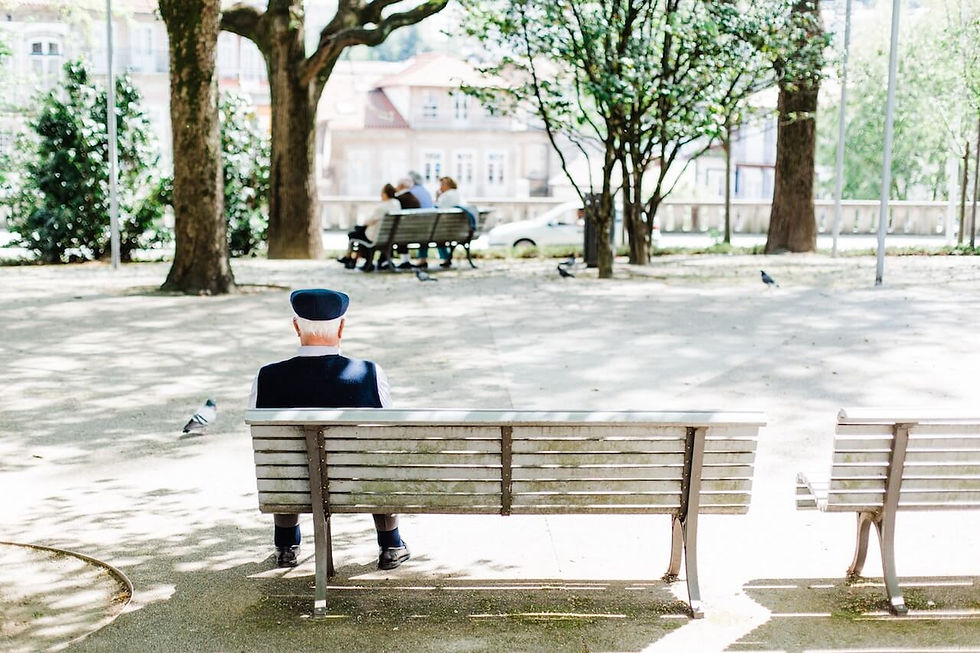Loneliness: A Modern Epidemic
- harish segon

- Sep 2, 2025
- 5 min read
The spiritual leader Dalai Lama feels that, “Too much self-centered attitude brings isolation. Result: loneliness, fear and anger.” He adds that an extreme self-centered attitude is a source of suffering. Mother Teresa agrees with him that loneliness and the feeling of being unwanted is the most terrible thing.

Loneliness is forced isolation, while being alone is by choice. Writer Ruskin Bond explains the difference between the two in a subtle way: “You may not enjoy loneliness, because being lonely is sad. But solitude is something else. Solitude is what you look forward to, when you want to be with yourself. So solitude is something we all need from time to time.”
Loneliness is slowly engulfing the entire world like a pandemic. More and more people are going into their shells, losing social and family connections. The problem has assumed such gigantic proportions that the World Health Organisation has set up a commission to study the problem of loneliness and social connection. It aims to address loneliness as a pressing health threat, promote social connection as a priority, and accelerate the scaling up of solutions in countries of all incomes. The eleven-member commission is led by U.S. Surgeon General Dr. Vivek Murthy and the African Union youth envoy Chido Mpemba. It will submit its report in three years.
Dr. Vivek Murthy says that while loneliness has the potential to kill, connection has the potential to heal. The effects of loneliness are as bad as smoking up to 15 cigarettes a day, and the risk is even greater for those associated with obesity and physical inactivity. He added that these issues don’t affect just one country. “Loneliness is an underappreciated public health threat,” he warned.
The repercussions of loneliness with no social connections can be devastating. It is amply demonstrated by this tragic and heart-rending tale which was highlighted by the media including The Guardian and other newspapers. This is the story of Joyce Vincent, who died of an apparent asthma attack in her North London flat in December 2003. She was just 38 years old. The television was left on. The mail continued to be delivered. Her rent was set up to be automatically deducted from her bank account. The days rolled by and no one noticed she was gone.

Those days turned into weeks and the weeks into months. There were large trash dumpsters on the side of the building next to her unit, so the neighbors never thought much of the smell emanating from her flat. The floor was full of noisy kids and teenagers and no one questioned the constant thrum of television noise in the background.
Eventually, Joyce’s bank account dried up. Her landlord sent her letters of collection. These letters, like the others, simply fell into the stacks scattered about her floor. They went unanswered. Finally, with more than six months of overdue rent, the landlord got a court order to forcibly remove her from the premises. The bailiffs broke down the door, and it was only then that her body was discovered. By then, it was January 2006, almost three years after she passed away.
In that time, nobody ever came looking for Joyce Vincent. No family. No friends. No co-workers. No neighbor knocked on the door to see if things were all right. Nobody called.
Nobody checked in. She was 38 years old when she died.
This story is shocking in its social implications. It feels unfathomable that entire years could go by with no one noticing a person has died. Yet, these sorts of stories happen frequently. Chances are you’ve seen a news story similar to the one about Joyce Vincent. And they are all the same.

High rates of social isolation and loneliness around the world have serious consequences for health and well-being. The WHO Director-General Dr. Tedros Adhanom Ghebreyesus says people without enough strong social connections are at higher risk of stroke, anxiety, dementia, depression, suicide and more. Earlier, loneliness was mostly confined to Western countries but now all regions of the globe are affected by it. Human beings are social creatures and thrive within societies and relationships.
According to the World Health Organisation, in older adults loneliness is associated with a 50% increased risk of developing dementia and a 30% increased risk of coronary artery disease or stroke. Additionally, between 5% and 15% of adolescents are lonely, according to research findings. However, these figures are likely to be underestimations, says the WHO.
The problem becomes all the more serious if we consider the health risks of loneliness.
Human beings are social creatures. While it’s normal to feel lonely sometimes, we thrive within relationships and communities of people. When you feel isolated and cut off from others, it can take a toll on both your mental and physical health, sending your stress levels soaring, triggering anxiety and depression, and increasing your risk for heart disease and stroke.
Of course, loneliness is something most of us have to deal with at certain times. You may have to quarantine away from loved ones for health reasons, for example, as was so common during the COVID-19 pandemic. Moving to a new city for work, attending college far from home, grieving the loss of someone close, or breaking up with a romantic partner can also leave you feeling socially disconnected and alone.

In other circumstances, you may find that you have a number of casual acquaintances but no friends close enough to make you feel understood or cared for. Whatever the reasons for you feeling lonely, know that it is a normal human experience and there are steps you can take right now to help alleviate loneliness, protect your health, and strengthen your connections with others. Loneliness can leave people feeling isolated and disconnected from others. It is a complex state of mind that can be caused by life changes, mental health conditions, poor self-esteem, and personality traits. Loneliness can also have serious health consequences including decreased mental wellness and physical problems.
Loneliness can have a serious effect on your health, so it is important to be able to recognize signs that you are feeling lonely. It is also important to remember that being alone isn't the same as being lonely.
If loneliness is affecting your well-being, there are things that you can do that can help you form new connections and find the social support that you need. Work on forming new connections and spend some time talking to people in your life. If you're still struggling, consider therapy. Whatever you choose to do, just remember that there are people who can help.
The important thing is to admit your need for social connection and seek out meaningful relationships. The New York Times reports that according to a 2021 poll, more than half of Americans say they are lonely. Loneliness can also prove to be counterproductive. As they say, “An idle brain is the devil’s workshop,” and such people can easily take to excessive drinking, drugs, or petty crimes. Some even go to the extreme of joining terrorist groups.
Always seek help or decide to help others when you feel lonely. In a study of ten thousand volunteers in Britain, about two-thirds agreed that volunteering had helped them feel less isolated.
Taking even a small step toward building social connections can help your confidence. Remember, loneliness can be viewed as a signal that you need more human connection. Take out time for developing quality relationships with family and friends. Even art therapy can help in uplifting mood, combating stress and bolstering self-esteem. Develop hobbies like reading, listening to music or gardening. Taking out time for activities you love is a great form of self-care. Outdoor activities like walks, hiking and trekking act as morale boosters.
And last but not least, always seek help whenever you feel lonely.




Very well